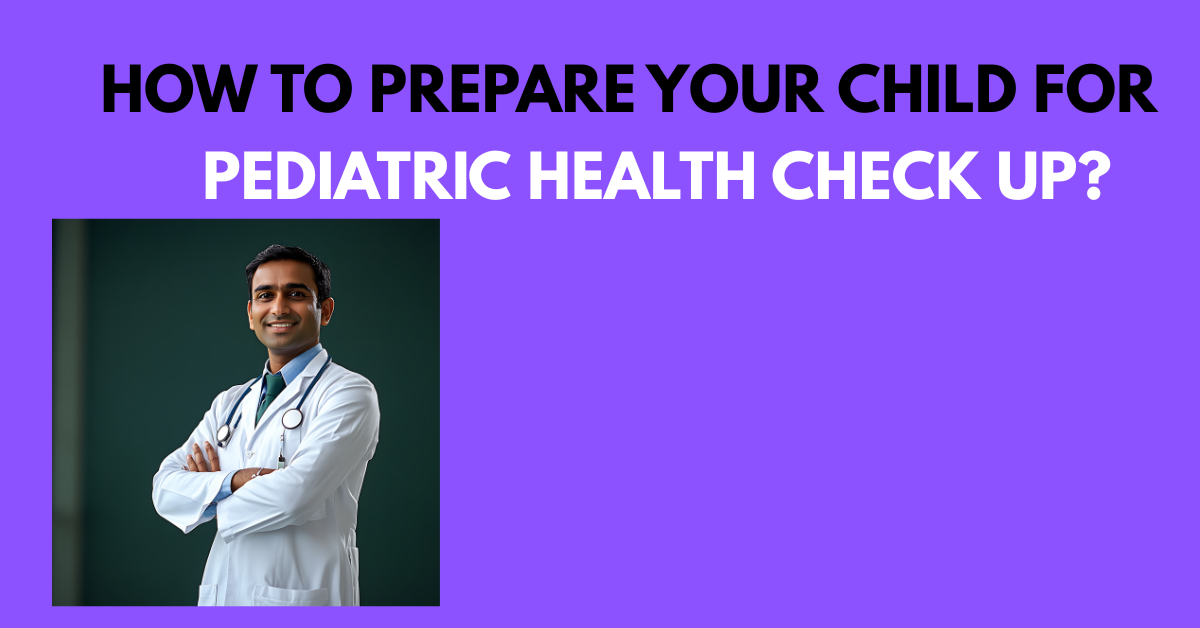As parents, we want nothing more than to see our children healthy, happy, and thriving. Yet, when it’s time for a pediatric health check up, many kids (and parents too!) feel anxious. The sight of white coats, medical equipment, or even the thought of a needle can be overwhelming for a child. But these visits are not just routine, they are moments of reassurance, prevention, and protection.
Preparing your child for a pediatric health check up with patience, empathy, and love can make the experience smoother and even help build lifelong trust in healthcare. This guide will show you not only the practical steps but also the emotional ones that make all the difference.
Why Pediatric Health Check Ups Matter?
A pediatric health check up is more than a doctor’s appointment. It’s a chance to:
- Track your child’s growth and development.
- Ensure they are meeting developmental milestones.
- Get vaccinations that protect against serious illnesses.
- Discuss everyday concerns like sleep, nutrition, or behavior.
- Detect health problems early, when they are easiest to treat.
For children, these visits may feel like a small moment. But for parents, they are stepping stones toward securing a healthy future.
Steps to Prepare Your Child for a Pediatric Health Check Up
Step 1: Talk to Your Child with Honesty
Children are smarter than we often give them credit for. If you say, “This won’t hurt at all,” but then they feel discomfort during a vaccine, trust can break. Instead, use gentle honesty:
- “The doctor will check your heart and tummy.”
- “You may feel a little pinch, but it will be quick, and I’ll be right next to you.”
Being truthful builds trust, reduces fear, and teaches your child resilience.
Step 2: Make It Feel Like an Adventure
Turn the pediatric health check up into something positive rather than scary. A few creative ideas include:
- Storytelling: Tell them the doctor is like a superhero checking if their body is strong enough to fight germs.
- Role Play: Play “doctor and patient” at home with a toy stethoscope. Let your child examine you first.
- Rewards: Plan a fun activity after the visit—like ice cream, a favorite game, or a trip to the park.
When children associate doctor visits with love and positivity, fear begins to fade.
Step 3: Pack Comfort Essentials
Bring items that soothe and comfort your child. These small things can make a big difference:
- A favorite toy, blanket, or stuffed animal.
- Snacks and water for after the visit.
- Books or coloring sheets to keep them engaged while waiting.
When children feel safe and surrounded by familiarity, they are more at ease during their pediatric health check up.
Step 4: Prepare Yourself as a Parent
Children often mirror their parent’s emotions. If you feel anxious, your child will too. Here’s how you can prepare:
- Write down questions you want to ask the doctor (feeding, sleep, behavior).
- Bring your child’s health record and vaccination card.
- Stay calm and reassuring, even if your child cries.
Remember: it’s completely normal for children to feel nervous. Your calm presence is their biggest comfort.
Step 5: Explain What Will Happen
Breaking the unknown into simple steps can reduce fear. For example:
- “The doctor will look in your ears with a tiny light.”
- “They will listen to your heartbeat with a stethoscope.”
- “If you need a vaccine, it will feel like a quick poke.”
This helps children feel prepared and in control, rather than surprised or scared.
Step 6: Encourage Questions
Empower your child by letting them ask the doctor questions. Encourage simple ones like:
- “Why do you check my ears?”
- “What does this light do?”
This transforms the pediatric health check up into a learning experience, making them feel valued and brave.
Step 7: Focus on the Positive Outcome
Instead of focusing on the discomfort of the visit, emphasize the benefits:
- “This check up makes sure you are strong and growing.”
- “The doctor helps us keep you safe from germs.”
- “Every time we go, we learn more about how healthy you are.”
Shifting the focus from fear to growth builds a healthy mindset toward medical care.
What Happens During a Pediatric Health Check Up?
Depending on your child’s age, a check up may include:
- Physical Exam – Measuring weight, height, head size, blood pressure, and listening to the heart and lungs.
- Developmental Check – Assessing movement, speech, motor skills, and social responses.
- Vaccinations – Following the recommended immunization schedule.
- Health Guidance – Advice on nutrition, sleep, safety, and daily care.
- Parental Q&A – A chance for you to ask about concerns like fussy eating or frequent colds.
Each visit ensures your child is not just growing in size but also developing emotionally, socially, and mentally.
Tips to Reduce Anxiety on the Day
Here are some tips to reduce anxiety on the day:
- Arrive early so your child has time to settle.
- Use calming words like “check up” instead of “doctor visit.”
- Offer praise for bravery, no matter how small.
- Stay present and hold your child’s hand if they are nervous.
A little reassurance goes a long way in turning fear into courage.
How These Check Ups Build Lifelong Health Habits?
The way children experience healthcare in their early years shapes their future attitude toward it. A warm, positive pediatric health check up:
- Encourages them to speak openly about health.
- Builds trust in doctors and medical care.
- Reduces fear of hospitals as they grow older.
- Creates a foundation of preventive care rather than crisis care.
By preparing them with love, you’re not just making today easier—you’re shaping a healthier tomorrow.
Launch Smart, Launch Strong with KidsCur!
Preparing your child for a pediatric health check up is about more than just getting through the appointment. It’s about holding their little hand, looking into their eyes, and showing them that health is love in action.
There may be tears, a few protests, and perhaps a moment of fear but with patience and compassion, you can transform doctor visits into experiences of safety and trust. That’s where KidsCur comes in. Whether you want to keep track of all the prescriptions or you want to search pediatricians, KidsCur makes it easier for you.
Simplify parenting with our app.
Click on This Link

FAQs
How often should my child have a pediatric health check up?
Most children should have regular check ups once a year. However, during infancy and toddler years, visits are more frequent (at 1, 2, 4, 6, 9, 12, 15, 18, and 24 months) to closely track growth, development, and vaccination.
How can I reduce my child’s fear of visiting the doctor?
You can prepare your child by explaining the process in simple words, using role-play games, bringing comfort items like a toy or blanket, and reassuring them that you’ll be by their side throughout the pediatric health check up.
What documents or items should I bring to the pediatric health check up?
Always bring your child’s vaccination card, medical history, list of medications (if any), growth record, and a list of questions you want to ask the doctor. Carrying comfort items for your child also helps.
What should I ask the pediatrician during the check up?
Parents can ask about their child’s nutrition, sleep patterns, growth milestones, behavior, vaccination schedule, and any recurring health issues like colds or allergies. This ensures all concerns are addressed.
Why are pediatric health check ups so important even when my child seems healthy?
Check ups are preventive. They help detect hidden health issues early, ensure vaccinations are up to date, track growth and developmental milestones, and give you expert guidance on raising a healthy child.

